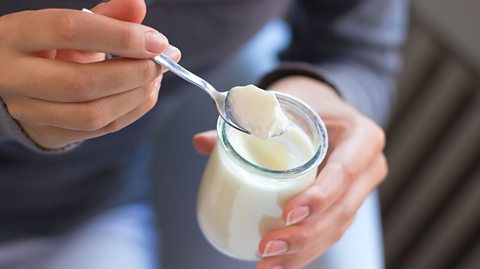Is some saturated fat better for health than we think?
by Sue Quinn

Dairy products have developed an unhealthy reputation due to the saturated fats they contain. But a large suggests some of the saturated fats in dairy might actually protect against β not contribute to β heart disease.
The results appear to challenge public health advice about the extent to which we should limit our intake of full-fat dairy to protect the heart, although there is no suggestion that we should eat unlimited amounts. So, are the kinds of saturated fats we consume more important than how much of them we eat?
What the Swedish research shows
The study, by an international team of researchers, tracked 4,150 Swedish 60-year-olds for more than 16 years, and found those with the highest intakes of dairy had a lower risk of cardiovascular disease than those with low intakes. It also found no link between higher intakes of dairy and an increased risk of death.
The study did not look at the kinds of dairy products participants consumed. Instead, their blood was analysed to measure levels of certain fatty acids (the building blocks of fat) associated with dairy.
Because dairy consumption in Sweden is among the highest in the world, researchers combined their results with an analysis of 17 similar studies involving almost 43,000 people in a number of different countries. This confirmed the findings of the Swedish research.
Lead author of the study, Dr Kathy Trieu from The George Institute for Global Health in Australia, says the results suggest cutting down on dairy might not be the best choice for heart health. βIncreasing evidence suggests that the health impact of dairy foods may be more dependent on the type β such as cheese, yoghurt, milk, and butter β rather than the fat content, which has raised doubts [about] if avoidance of dairy fats overall is beneficial for cardiovascular health,β she says.
A spokesperson for the (which has replaced Public Health England), says the governmentβs independent Scientific Advisory Committee on Nutrition (SACN) is currently finalising a review of official saturated fat advice and would report βin due courseβ. But βwith approximately 158,000 deaths from cardiovascular each year in the UK and with average intakes still above recommendations, it remains important to continue to advise and support people to reduce their total saturated fat intake,β they say.
Link between dairy and health

Many have suggested dairy foods such as milk, cheese and yoghurt can have a neutral or even positive effect on reducing a personβs risk of cardiovascular disease, despite their saturated fat content. has also linked consumption of some dairy products with a lower risk of developing Type-2 diabetes and high blood pressure, both factors that increase our likelihood of cardiovascular disease.
βWhat we have are messages that some dairy may have some protective effects on cardiovascular disease, although we donβt really know the mechanisms,β says Dr Duane Mellor, registered dietitian and Lead for Nutrition and Evidence-based Medicine at Aston Medical School.
Advice to limit our intake of saturated fats has been government for decades. This is based on the idea that, in general, saturated fats raise levels of LDL (low-density lipo-protein, also known as βbadβ cholesterol), which can cause βfurringβ of the arteries and increase our risk of heart attack and stroke. This advice does not differentiate between types of saturated fats though, partly because most foods, including dairy, are complex and contain many types.
But one holds that you metabolise saturated fats called odd-chain fatty acids (those with an odd number of carbon atoms) differently to others. Odd-chain fatty acids are found in small concentrations in milk fat, the meat of ruminant animals (cattle, sheep, goats and deer, for example), and some plants.
βIt could be that odd-chain fatty acids canβt be used to make LDL cholesterol, or they donβt get circulated, or theyβre used in different pathways in our body,β says Dr Mellor. βThese are just some of the theories being explored, but more evidence is needed.β
Victoria Taylor, Senior Dietitian at the British Heart Foundation, says the links between dairy foods and heart and circulatory health remain unclear. It could be that nutrients in dairy, rather than specific kinds of fatty acids, play a key role in protecting your heart. βResearchers think a range of nutrients found in milk, including calcium, potassium and phosphates, could also be involved,β she says. βThere is also a suggestion that these nutrients might be working in combination, which could be why differences are seen with different types of dairy.β So, does official health guidance advising women and men to limit their intake of saturated fats to 20g/30g respectively per day need to change?
Official advice on dairy
Susan Jebb OBE, Professor of Diet and Population Health at Oxford University, says the advice for the public to reduce their overall intake of saturated fats remains in place because, as a population, we eat too much. Clinical trials have shown that cutting back reduces levels of LDL cholesterol, and therefore the risk of cardiovascular disease.
βI canβt think of any evidence that eating more saturated fat, even if itβs dairy, is good for you, so the reduction message persists,β Professor Jebb says. Reducing saturated fat has many broad benefits β for example, as well as decreasing our risk of cardiovascular disease, eating less meat reduces our chances of developing colorectal cancer, she says. Eating fewer cakes, biscuits and pastries decreases our intake of saturated fat along with sugar and calories, thereby reducing our risk of obesity. βThatβs probably the biggest diet-related risk factor for heart disease,β she says.
Although cheese may contain certain fatty acids that are less harmful than others, this does not mean itβs healthy to eat in large or unlimited amounts. βAs ever, a little can easily fit into a healthy diet, but people need to be conscious of the calories and salt in cheese, as well as the saturated fat content.β
The governmentβs recommends we include dairy or dairy alternatives in our diet, but guidelines limit our saturated fat intake to 20g per day for women and 30g for men.
Dr Mellor believes it might be time for public health messaging about saturated fats to change to reflect the heart-protective benefits of eating small amounts of dairy, and to assure the public that full-fat dairy doesnβt have to be avoided.
Cheese and yoghurt in particular are valuable sources of protein and calcium, he says, as well as being βconsistently linkedβ to reduced risk of cardiovascular disease. Scientists say the most evidence to support the health benefits of dairy exists for . It has properties that limit the amount of fat absorbed by the body, which reduces the risk of cardiovascular disease. The health-protective evidence for butter is less clear.
βIβm not saying we should eat lots of full-fat dairy,β says Dr Mellor. But he believes eating three small servings of full-fat dairy daily is healthy. This could include a thumb-sized piece of cheese, a small pot of full-fat yoghurt and a third of a pint of full-fat milk. βSo long as itβs included in a diet thatβs rich in vegetables and other nutritious foods,β he says.
Crucially, the public needs to make smart choices when it comes to eating foods containing saturated fats. The biggest problem is not full-fat dairy, but foods that contained few nutrients.
βOne of the main sources of saturated fat in the British diet is pies, pastries, cakes and biscuits, which have manufactured saturated fats in them,β says Dr Mellor. βThese are the ones we need to watch out for because they donβt just come with the fats, they come with sugars and low-fibre flours.β
Most scientists, including those who led the Swedish research, agree that dairy foods are highly complex and their role in protecting heart health β or otherwise β is not fully understood. More research is needed to determine whether particular kinds of fats in dairy, and/or the wide range of nutrients they contain, impact cardiovascular health.
How reliable is the study?
Dr Mellor says the Swedish study has strengths and weaknesses. βThe problem with a lot of nutrition studies is theyβre based on people remembering and reporting what theyβve eaten, which can be unreliable,β he says. βThis one looked at markers in the blood called odd-chain fatty acids, which can only really come from dairy products, so thatβs one of its strengths.β
However, Victoria Taylor says the study doesnβt prove higher intakes of dairy reduce the risk of cardiovascular disease β βother forces, such as lifestyle factors, may be at play,β she says.
The study and analysis only involved participants in Sweden, the US, the UK and Denmark, and therefore cannot be applied to all ethnic groups with certainty, researchers warn. But Dr Mellor says a strength of the research is that it was informed by several studies in which large numbers of people of varying ages and sexes, across different countries, took part.
The study also only offers a limited insight into the relationship between dairy consumption and cardiovascular disease. βThe real problem is we donβt know which types of dairy might provide the protective benefits,β says Dr Mellor. βWeβre still missing information.β
This article was first published on 14 October 2021